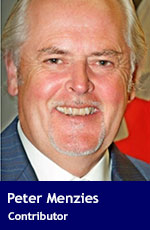 The chair of the Federal Communications Commission (FCC) is an intelligent, articulate man who, in the name of liberty, appears determined to destroy freedom of access to an unbiased Internet in the United States and, inevitably, Canada.
The chair of the Federal Communications Commission (FCC) is an intelligent, articulate man who, in the name of liberty, appears determined to destroy freedom of access to an unbiased Internet in the United States and, inevitably, Canada.
I met with Ajit Pai once or twice when he was an FCC commissioner and felt we shared common inclinations when it came to the need, in general, for less meddlesome regulation.
But in his zeal to deregulate – foolishly starting with repealing the net neutrality safeguards put in place three years ago by his predecessor, Tom Wheeler – he appears blind to the concept that threats to the unbiased access we have all enjoyed since the Internet’s inception aren’t limited to government.
The Internet has flourished thanks to the absence of gatekeepers. It’s not print, it’s not broadcasting, it’s not telephony, it’s not cable. It’s the Internet.
Philosophically, it’s equivalent to speech. Legally, its distributors are common carriers, which means like the Internet itself they must be blind to the content carried and treat all equally well or equally poorly. (The concept of common carriage has been part of our legal traditions in managing obligations of ship owners, innkeepers, ferrymen and stable keepers for hundreds of years.)
Since 2008, the Canadian Radio-television and Telecommunications Commission (CRTC) has ensured the Internet remained unbiased in this country by using the principle as it’s embedded within the Telecommunications Act (Sec. 27(2)).
The provision of service without “undue or unreasonable preference” has been part of the World Wide Web since its inception, even while those who wish to violate it now – Comcast, Verizon, AT&T, etc. – distort the debate by using an Orwellian twist to claim net neutrality loyalists are the ones regulating the Internet.
This is bunk. None of the current regulations in North America regulate the Internet. What they do regulate is the conduct of those who have built the ‘pipes’ that carry and deliver the Internet and everything within it to all of us.
What Pai is deregulating is not the Internet at all – it’s the rules that apply to the companies that provide the underlying infrastructure upon which the Internet is delivered and that prevent them from (to use a technical term) monkeying with it.
If Pai is successful – and despite more than 20 million submissions to the FCC on this matter, it appears inevitable that he will be – those companies will be free to monetize their positions by selling preferential access to some of their customers. And they will.
Netflix, for example, could pay to ensure that at times of network congestion when Internet service providers (ISPs) must “throttle” bandwidth, their service isn’t diminished. That this preferred fast-lane access may come at the expense of slowing files being delivered to the local hospital will be as may be.
The end result of this in the U.S. is that ISPs will have more freedom and you, as an Internet user (and in ways you’ll likely be completely blind to) will have less.
The Canadian approach, in contrast, doesn’t ban ISPs entirely from discriminating between different types of traffic on networks. What it does insist upon, though, is that any such discrimination be just, as in defensible and reasonable. This allows ISPs plenty of flexibility to conduct their business and compete on price, quality and availability of service while ensuring its pipes remain agnostic to what’s flowing through them.
Canada was a world leader on this and a source of some inspiration to Wheeler when, sensing the threats to net neutrality, he moved to protect it.
Sadly, the removal of those protections by Pai could very likely force Canada and the CRTC to follow down the FCC’s misguided path.
Peter Menzies is a former newspaper publisher who served as a CRTC commissioner for 10 years.
Peter is a Troy Media Thought Leader. Why aren’t you?
The views, opinions and positions expressed by columnists and contributors are the author’s alone. They do not inherently or expressly reflect the views, opinions and/or positions of our publication.
